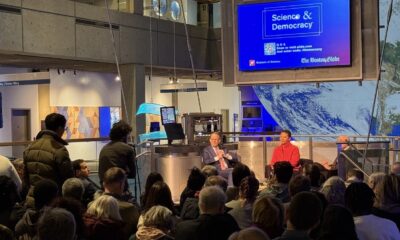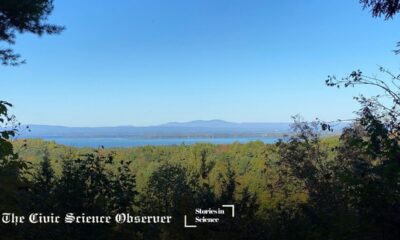The Evolution of Fear
Ihad obviously gotten into my graduate program by mistake. When I first started, the scariest thing was everyone in my class discovering I had no idea what neuroscience was all about. The first semester was spent hiding the fact that I was Googling every other word during lectures, trying to figure out what juice and eye movements had to do with understanding the brain.
As I finished courses and was released into the wild world of lab work, my biggest fear was that all my experiments would fail.
Then everyone would really know I had no idea what I was doing.
After some data started magically materializing, I was afraid I’d get scooped any day now. What if I wouldn’t be able to publish my work after all these late nights of shedding depressing amounts of blood, sweat and tears?
Miraculously, as statistically significant trends emerged from fitful bursts of data, I began cobbling together a scientific story. Then I realized the scariest thing is actually that looming thesis defense.
What could be more fear-inducing than a panel of experts in your field publicly calling into question everything you’ve missed out on parties, vacations and earning potential to do over the last 5+ years of your life?
But I was wrong.
What’s DEFINITELY the most terrifying thing in the world is trying not to trip in heels on a slick stage, remembering to hold your hips at this angle and your head at that angle, steeling your nerves to pose in front of hundreds of strangers, all of whom are actively looking for you to fall flat on your face.
Judging.
Judging your every move.
Judging you so hard on things that you’ve never subjected yourself to judgment on before – that which has little to do with your academic performance, and more to do with social expectations outside your control. You can only rely on visual illusions, on-the-spot behavior, and whatever gibberish your brain releases from your mouth while you sweat in the spotlight, smiling like a maniac.
That experience is way scarier than anything I went through during my PhD, and has influenced my outlook on life just as much as my research experience.
Why Enter A Pageant?
My younger tomboy self would have been absolutely horrified to know that a beauty pageant was in her future.
Even as I turned in the pageant application, the realization dawned that I probably had to stop engulfing entire family-sized bags of potato chips in one sitting.
My feminist brain also started screaming about hypocrisy and everlasting shame.
“You’re a scientist! Think of the children!”
Little did my brain know that taking part in this event was an experience that taught me some of the most important lessons I will ever learn in life.
I learned how to check my own biases, set realistic expectations and counter insecurities.
I learned about the value of a truly open mind, applied critical thinking and the willingness to roll up your sleeves to do the work needed for the results you want – because squats and kettlebell swings certainly don’t do themselves.
I learned how much of life is actually a carefully orchestrated performance, and how much work it takes behind the scenes to support even a brief moment in the spotlight.
And yeah, I also learned that apparently butt glue is a thing.
But let’s start at the beginning…
The Beginning
The daughter of Chinese immigrants, I was raised in an academic household – I grew up drawing on the backs of paper manuscript drafts and getting a professional physicist’s explanations to all of my unending questions.
Inspired by a scientific way of thinking about the world and a fascination with human and animal behavior, I was pretty sure I wanted to be some kind of scientist…or writer…when I grew up.
After my undergraduate coursework and laboratory experience purifying proteins and playing with chemotherapy drugs, I figured out my preference for working on projects with a stronger behavioral scope. I found molecular-level research tedious, and unfortunately that’s exactly what I chose to specialize in.
Thus I gave into family pressure, applied to doctoral programs, and somehow weaseled my way into a joint neuroscience program between Brown University and the National Institutes of Health.
Graduate research training is an especially interesting experience for someone who is relatively new to their field. You start using your literature research and deductive reasoning skills right away, because you aren’t starting from the same baseline as everyone else!
Given I began my first year as a PhD barely knowing what a neuron was, it amazes me that I managed to find a lab that let me develop a fitting research project for my interests. As I studied the evolution of neural circuits during motor learning, I was fortunate to be co-mentored by two very different but equally brilliant PIs, working with fancy 2-photon microscopes and spending more time with mice than with fellow human beings.
The third-year blues hit hard. Depression, experimental monotony and social isolation drained much of my energy, and the only way out seemed to be inserting some distractions into my routine.
And so started the freelance writing, music videos, volunteering on the student council, bubble tea addiction, and a brief attempt at learning Brazilian Jiu Jitsu. This got me most of the way through grad school, and the light was appearing at the end of the tunnel.
And then came the pageant.
Choosing to Learn
I entered the local cultural pageant the same year I defended my PhD thesis. Before this, my only experience and opinion of these spectacles was probably what the average young feminist’s view is: that they are exploitative events which display women in a superficial light, reinforcing negative stereotypes about the value and role that women have in society.
Alas, despite this mindset, my competitive spirit had been roused upon cheering on a friend in the pageant’s previous final event.
Suddenly, my brain was whispering crazy things.
“Hey. If these gals can do it, you can too!”
“Never mind the fact that you have no idea what the difference between primer and foundation is. Who cares if you’ve never worn heels in your life.”
“That looks fun. That looks easy. You could do just as well as them. Maybe you could win!”
Sometimes the fastest way to teach your ego a lesson is to give in to its naive assertions.
Preparing for a pageant is a surprisingly engaging intellectual challenge if you decide you want it to be. From the beginning of that year, I was not only hustling to collect final data for my dissertation. I was also learning about the science of weight training, getting creative with low-carb diets, and analyzing exactly why models looked so dashing and confident on the runway.
When I tried walking in heels, I just looked like I had rolled both my ankles.
Being a poor graduate student with no fashion budget (or fashion sense, let’s be honest), I bought a used sewing machine and experimented with tailoring dresses from discount websites and the sales racks at Macy’s.
I searched for “walking in heels” on Youtube and played videos in slow motion until I uncovered the secret to the sexy sashay, practicing in lab when no one was watching.
I watched makeup tutorials between time points with equal parts frustration and fascination, and practiced my talent song during lonely imaging sessions in the basement lab.
I discovered that my classmates and friends weren’t ashamed or horrified that I was competing in a pageant. On the contrary, they all seemed genuinely excited to support me at the finals, which took place just weeks after my thesis defense.
That had been the proudest moment of my life, walking out of the defense room to classmates, cheers and cake as a newly minted PhD. Success at last! I thought that was the very pinnacle of my life achievements thus far.
But what ended up beating that moment was finding myself a PhD in a pageant gown, advocating for science in front of loved ones and hundreds of strangers during the pageant Q&A round. I presented myself in a way that made me proud to be there, to prove to myself that scientists don’t just belong in the lab – we can and should go anywhere that interests us.
While I didn’t win the crown, I made it into the top 5, and walked away with life-changing prizes: increased self-confidence, a stronger body, new friends, and a new sense of empowerment.
If someone like me could be a PhD and a pageant finalist – well, anything is possible!
This attitude of giving a new challenge a whole-hearted try, even when you seriously doubt it will yield meaningful results, is what helped lead me out of academia not too long after the pageant. I followed my gut straight into new adventures at the front lines of the biotechnology and business world, where I currently am today.
Don’t Hang Yourself From One Tree
To those feeling stuck in your journey through science or life, keep in mind the mildly morbid Chinese saying, “Don’t hang yourself from one tree;不要在一棵树上吊死.“
Don’t be too proud to learn. Don’t be too quick to pass judgment before you’re run some experiments outside the box. What seems easy or frivolous from a distance may not feel quite so easy and frivolous when you give it a try yourself.
There is no single definition of success in life. There’s no absolute scale bar that you can measure yourself against in our rapidly changing world. The more intersections you can comfortably stand in – linking different fields, social groups and skill-sets – the more prepared you will be to make your life a success.
A pageant is most certainly not a PhD, but if you choose to let even the most seemingly mundane experience teach you something, you’ll be surprised at how much you’ll grow. Free your mind to #FreeYourPhD!
Cover Image by Lorilynn Oliver from Pixabay


 Civic Science Observer1 week ago
Civic Science Observer1 week ago























